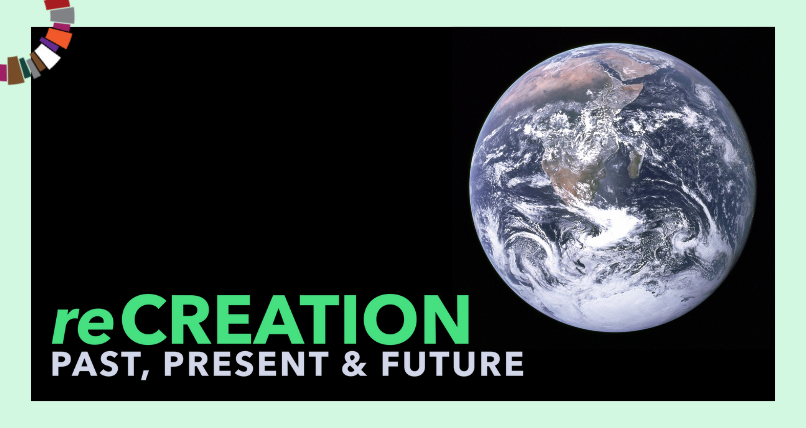reCreation: Past, Present and Future

16 July to 17 September 2023
The first readers and hearers of the story of creation, found in the early chapters of Genesis, had little sense of the size, nature, and scope of the world nor the task the Creator gave them in stewarding it. Over the centuries that followed, human knowledge grew and successive generations reimagined life in the light of their expanding knowledge.
For example, when people could not travel freely, knowledge was limited to, and dependent upon, the place where they lived and visitors they received. Knowledge grew when explorers returned with fascinating tales of distant lands, peoples and creatures. Those who wrote and compiled the Old Testament had a horizon limited to the Middle East. By the time of the New Testament writers, it had expanded to the Roman Empire.
Read more below the table
Series Schedule – click the sermon title to watch
| 1 | 16 July | Genesis 1:1-31 | The Revelation of Creation | Stephen Baxter |
| 2 | 23 July | Genesis 1:26-31 | Good and Very Good | Matt Henderson |
| 3 | 30 July | Genesis 1:1, 31 Romans 1:20 | A Sacred Universe | Stephen Baxter |
| 4 | 6 Aug | Genesis 2:4-7 | The Earth is our Home | Stephen Baxter |
| 5 | 13 Aug | Genesis 1:26-28 | Original Blessing … the universe as gift | Michael Henderson |
| 6 | 20 Aug | Psalm 8:1-9 | Being Human: dust of the earth, breath of the divine | Matt Henderson |
| 7 | 27 Aug | Genesis 3:1-8 | Un-Original Sin | Stephen Baxter |
| 8 | 3 Sept | Genesis 1:26-30 | “Complete Authority” | Matt Henderson |
| 9 | 10 Sept | Genesis 1:31-2:2 | The Seventh Day Entering Rest | Stephen Baxter |
| 17 Sept | Sanctuary Sunday |
Then, arriving at the Protestant Reformation, the horizon was Europe. By this time it was expanding rapidly, through nautical exploration pioneered by Columbus, and the proposal of Copernicus that the earth revolved around the Sun – not the other way around. This discovery had a profound, transformative effect on every aspect of Western culture including spirituality and the Reformation. Interestingly, Martin Luther and Nicolaus Copernicus were contemporaries, born and buried within 10 years of each other.
Propelled by technology and space travel, today’s horizon is literally out of this world. We are now the first generations in human history to look back at ourselves from outer space. It is encapsulated by the photograph of the ‘blue marble’, taken by Apollo 17 astronauts in 1972. This picture of a fragile, vulnerable, and isolated Earth suspended amid the vast emptiness of space, changed the world. Historian Robert Poole suggests,
“The sight of the whole Earth, small, alive, and alone, caused scientific and philosophical thought to shift away from the assumption that the Earth was a fixed environment, unalterably given to humankind, and towards a model of the Earth as an evolving environment, conditioned by life and alterable by human activity, it was the defining moment of the twentieth century.“
It was a defining moment because it lengthened our horizon, and shifted our perspective. In past eras, the many unknown regions of the world beyond the horizon were exotic, exciting and ripe for exploration. Today, those regions are vastly reduced. What’s more, they are easily recorded in video and introduced to us via our smart phones.
The old stories we told ourselves to explain who we are, what we do and why we are here, are no longer adequate. The exploration of space, the insights of modern science, rapidly changing technology, and the communication revolution, have destabilised all the old meta-narratives. Today, for the first time in human history and despite the remaining differences in language, customs, worldviews and religion, there is a collective “knowing” that we share the one planet and the one destiny. Everything is interrelated. We cannot ignore each other. We must learn how to work together to ensure and secure our future.
For younger generations, any spirituality or religion that appears indifferent or ignorant of our ‘fragile’ world, and reluctant to work together for the future, is quickly dismissed as out-of-date, inadequate, irrelevant and even dangerous. Any answers to the questions of “Who am I?”, “How did we get here?” and “What does the future hold?” can only be addressed in the context of this expanded horizon.
Can we find in Genesis a story big enough to answer the deep question of today? Is it big enough to encompass all of life for every human being?
The answer is yes.
But it needs a deep reframing, not dissimilar to the reframing the Reformers undertook in their day in the light of their current new discoveries and technological change. Our task is to reimagine and reinterpret our Creation stories with a narrative big enough and meaningful enough to recapture our imaginations and provide new vision for what God is doing in our world.
In this series we revisit the first few chapters of Genesis, hoping to begin developing a spiritual theology that is aware of these expanded horizons and attuned to the spiritual longings of contemporary Hobartians.
